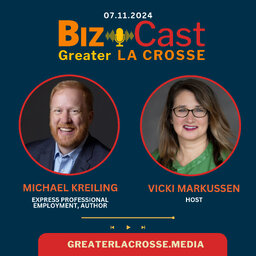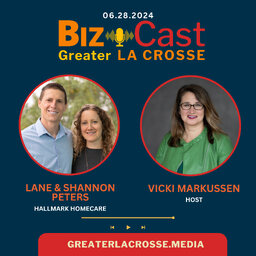
Episode 04
State of Tourism with AJ Frels, Explore La Crosse
About BizCast Greater La Crosse
We bring you news from the business community. From startups to experienced problem solvers, you’ll get in-depth insight on the challenges and opportunities of doing business in Greater La Crosse. Our show is a collaboration between WIZMNews.com and BizNews Greater La Crosse ( GreaterLaCrosse.media ).
Takeaways
- Workforce Connection provides seven programs through federal and state funds.
- Help people find employment.
- Identify what people excel at and steer them to growing industries if possible
The labor market shortage started long before the pandemic. It started probably in about 2012-2013, when the retirees from the Baby Boomers started retiring, so they hit 65 there in the early 2000s, 2010, we’ll go. Then as soon as they all started retiring, only one baby was born for every two Baby Boomers that left the market. So we just don’t have those bodies, those babies were not born to take over. And so there’s a huge gap and a huge shortage right now in the labor force. What they’re seeing, they’re very much seeing that in the retail sector and the food service sector.
People aren’t coming back for those low wage jobs, They are trying to find a different alternative because they simply can’t physically, mentally, or emotionally continue to work three jobs that don’t have health insurance and life insurance. So they’re really trying to assess what makes the most sense in their family.
Only about 20 people are receiving unemployment in their multi-county area. They usually have a disable child at home.
When they come to for us, we give them a little bit of time to figure out your childcare, where’s your transportation, what kind of employment do you want to do? We help them set their stage, set their foundation, so that when they do start their job, they’re not automatically one emergency throws them, you know, for a loop, and then they lose the job.
The great resignation, that we’ve heard about, it was a great upgrade. People were looking for different types of employment. They were looking for employers who are able to value them and their work-life balance. The pandemic really exacerbated that labor market shortage, but specifically in retail, specifically in the food industry.
We’re here to lift people up. It’s uplifting to help people, and the more we can do that, the better off we are as an organization, as a culture, as a community.
Transcript
Teresa Pierce 00:00
There’s a huge gap, a huge shortage right now in the labor force. They’re seeing that very much in the retail sector and the food service sector. They’re lower wage jobs, and that’s where people can say, man, if I just get a little bit better over here, I can make more money.
Vicki Markussen 00:18
Welcome to BizCast Greater La Crosse – news from the business community. I am your host, Vicki Markussen. Joining me today is Teresa Pierce. She is the executive director with Workforce Connection. Workforce Connections has been around in the area. It is a fantastic place for people who just want to improve their life and being a stronger employee. So talk about Workforce Connections. What do you do there?
Teresa Pierce 00:42
We will be celebrating our 40th Anniversary in 2023. So we’re excited about that. Our mission is to connect people work, and training. So we work in Western Wisconsin, in the counties of Buffalo, Trempealeau, Jackson, , Monroe, La Crosse, Vernon, Crawford, and Trumpealeau. Did I say Trempealeau twice?
Vicki Markussen 01:02
Doesn’t matter western Wisconsin, we’ll just say.
Teresa Pierce 01:05
Western Wisconsin – eight counties of Western Wisconsin. We provide employment to training programs. We have seven federally or state funded programs that really are designed to help people who need to find employment, to get employment, as well as dislocated workers. When there are layoffs within the community, it is Workforce Connections that will come in and say , “How can we take you from the job you just lost to the new job you’re going to have next?” We really work with a person. We develop employability plans with them, but they develop the plan. They know what they want to do, and we are able to provide resources to help them do that. So if they can’t go to school because they don’t have transportation, we might be able to help them not only with their tuition, but with that transportation costs so they can get there. We firmly believe that education is the way out of poverty. And so if people can get stackable credentials, that will allow them to get just a little bit more in the workforce, just a little bit more, before they know it, they will be able to be at a place where they can provide for their family and their family self sufficiency. They might walk through our door and know nothing. It’s our job to know where they can go for housing, where they can go for transportation, where they can go for childcare, who they can connect with on all those different things. If food is an issue, if domestic violence is an issue,
Vicki Markussen 02:24
What is their existing skill set? What do they need, but to meet in the middle, you also have to understand what the employers need and what the trends are out there. Right. So how, how do you meet that middle? How do you know what direction to send them?
Teresa Pierce 02:36
Exactly. It is the connecting people work and training. That’s exactly what it is. It’s talking with businesses on a regular basis and saying, “What do you need?” We look at labor market statistics. We look at job unemployment. We really talk to that person and say, “What do you want?” We assess that you might want to be a nurse, but if you can’t stand blood, that’s not a good a good to be the best spot for you. And so really finding a way to hone in on what that person can excel at. Usually, the people who find their way into our offices have not had a lot of success in education. They were either, you know, lower in their class, maybe they didn’t graduate, maybe the school setting wasn’t for them. And so it takes a lot of courage to come back and say, “Man, I’m going to try this again. Because I don’t want to continue to have low wage jobs for the rest of my life.” We sometimes cobble together different funding streams that will help a person so when people come into the Job Center, we were looking at the different sectors that are important. And when Western Wisconsin, certainly manufacturing and advanced manufacturing. Healthcare is huge in this area, information technology, the business services. All of those businesses are really going without people in those jobs, and it’s really important for us to find a way to help them. What we don’t have is what everybody doesn’t have, is those warm bodies because there’s really a demographic issue. The labor market shortage started long before the pandemic. It started probably in about 2012-2013, when when the retirees from the Baby Boomers started retiring, so they hit 65 there in the early 2000s, 2010, we’ll go. Then as soon as they all started retiring, only one baby was born for every two baby or two Baby Boomers that left the market. So we just don’t have those bodies, those babies were not born to take over. And so there’s a huge gap and a huge shortage right now in the labor force. What they’re seeing, they’re very much seeing that in the retail sector and the food service sector. They’re lower wage jobs, and that’s where people can say, “Man, if I just get a little bit better over here, I can make more money.” So after the pandemic, what I think the business community found out is that people aren’t coming back for those low wage jobs, They are trying to find a different alternative because they simply can’t physically, mentally, or emotionally continue to work three jobs that don’t have health insurance and life insurance. So they’re really trying to assess what makes the most sense in their family for their families.
Vicki Markussen 05:16
I think there is a misnomer out there. You hear it out in the public, of people just don’t want to work. And people think there’s just these people that are sitting around without a job. That’s not who you’re servicing Correct?
Teresa Pierce 05:30
Not at all. Not at all. We have very, very few people who are on our case loads that are actually getting a check, maybe 20 in all of Western Wisconsin. Those 20 people who are who are receiving direct monthly benefits from us because they probably have a disabled child in the house and mom is home taking care of that disabled child. There’s usually a disability associated with it. Our job is to bring people in and set them up for success. So when they come to for us, we give them a little bit of time to figure out your childcare, where’s your transportation, what kind of employment do you want to do? We help them set their stage, set their foundation, so that when they do start their job, they’re not automatically one emergency throws them, you know, for a loop, and then they lose the job. The great resignation, that we’ve heard about, people were, actually, it was a great upgrade. People were looking for different types of employment. They were looking for employers who are able to value them and their work-life balance. The pandemic really exacerbated that labor market shortage, but specifically in retail, specifically in the food industry.
Vicki Markussen 06:38
How do you take people that just have many factors to getting back into work? How do you get them to upskill?
Teresa Pierce 06:47
We have been fortunate to get some money from the City of La Crosse through their ARPA funding. We created a program called Uplift. The entire focus of the Uplift program is to support the ALICE population. The Alice population actually comes through the United Way. And it is, is a acronym for asset limited, income constrained, employed people. So they’re people who don’t have a lot of assets. They aren’t making a lot of money, but they’re they have jobs. We used to call them the working poor. They’re now just low income wage earners. So what we’re trying to do is get to those people. They have so much going on in their life. They usually have family. They might come from a split family. So they’re juggling a number of different things, they’re juggling a number of different jobs. They might be juggling transportation related issues, childcare related issues. What we want to do is, is help them so that if they have an emergency that prevents them from getting to work, that we can help them with that. So let’s say you’re you’re you have a flat tire or something happens to your car. Come our way, and if we’ve determined you eligible for the program, we can help you with that emergency and get you back to work. That’s really our number one goal is keeping you employed. But if you so desire to go to the next level, we call it level two, we can attach you or have you do some virtual job skills training. That skills training is soft skills, you know – how to work through with a team, communication skills, things like that. There’s 12 different modules that we have people go through, which are part of our virtual training platform, so you don’t even have to leave the house. And if you do that, then we give you an incentive for you to be able to support your family a little bit. And you’re able to perhaps if your kid wants to be part of the soccer team, you might be able to help them you know, get some cleats for the soccer team. So we talk to you about those options. If you say hey, I’m kind of liking this, we can attach you to more of a harder skills. And so we can do some stackable credentials. If you want to get into the healthcare if you want to get into manufacturing. We want you to come in our door and we will help you figure out where how we can help.
Vicki Markussen 09:05
So there’s tools, there’s resources out there. How do people find your programs?
Teresa Pierce 09:11
The best way is to go online and look at www.workforceconnections.org
Vicki Markussen 09:16
Do you take referrals?
Teresa Pierce 09:18
We do. We partner with job service, the Department of the Division of Vocational Rehabilitation. We partner with CouleeCap. We partner with The Parenting Place. We partner with the schools, the technical college, everywhere we can partner to help the people that we serve is what we will do.
Vicki Markussen 09:40
One question I like to ask all guests is what makes you passionate about what you do?
Teresa Pierce 09:46
Yeah, for me, it’s about seeing people move from one level to the next. When I first started this job, someone said to me, we’ll never see that person again. So we that person had come in through our door. We provided a number of services, and when she left, she said, we’ll never see that person again. She got her degree. She’ll have a job. She’ll be fine. It just was one of those resonating moments, help them with education, get them a job, and they’ll be fine. We need to be more compassionate for people. There are so many people who come with issues well beyond what people can understand. The resilience that this population has is amazing to me. The things they can do is just phenomenal, in my opinion. I really have a great deal of passion for working with them and helping them move from this level to the next level. We have a wonderful success story out on our website about a gal who was suicidal. She had one of our case managers who reached out to her, with that reaching out to her, brought her a little bit under her wing, kinda stayed in touch. Three years later that gal did not need to have any more services, she wasn’t eligible for anything because she had a job that paid $22. She was in seventh heaven. She called our staff person and said, “Guess what? I don’t have any, I’m not eligible for anything. Thank you so much.” It’s just a heartwarming story. We’re here to lift people up. It’s uplifting to help people, and the more we can do that, the better off we are as an organization, as a culture, as a community.
Vicki Markussen 11:26
This was with Teresa Pierce, Executive Director of Workforce Connection. You’re listening to BizCast Greater La Crosse. We’ll catch you next time
Transcribed by https://otter.ai





